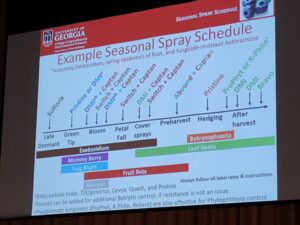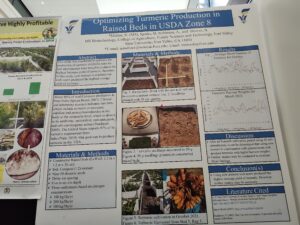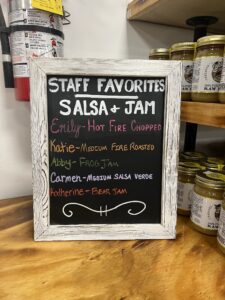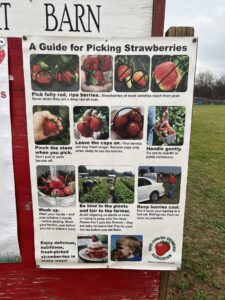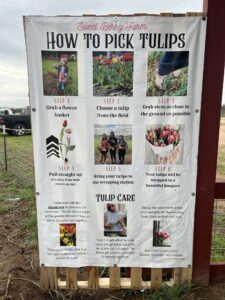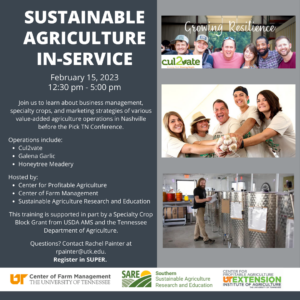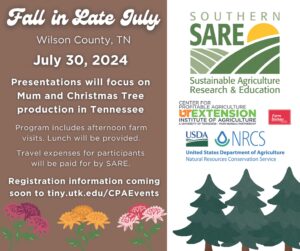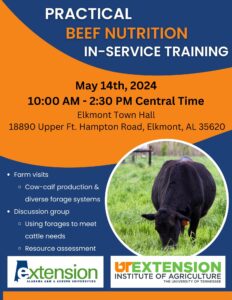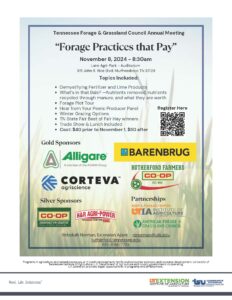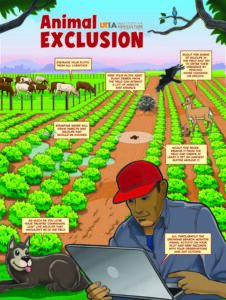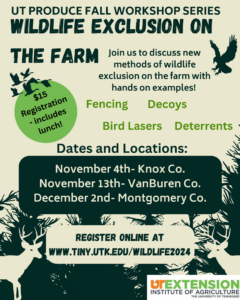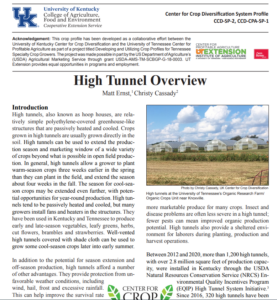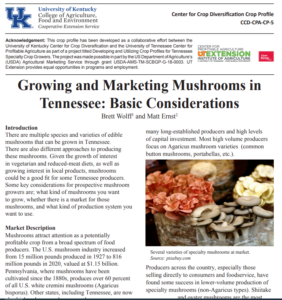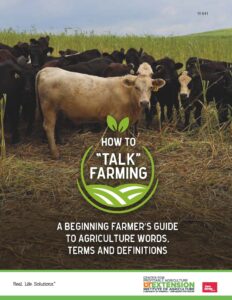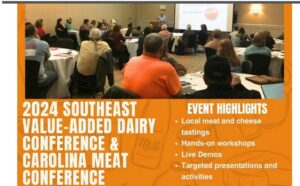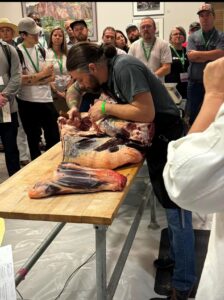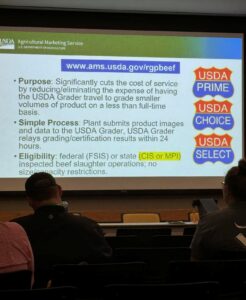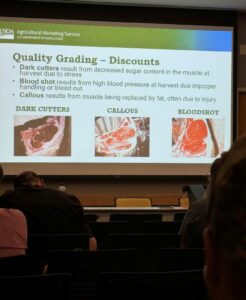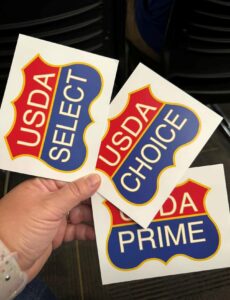Final report for STN22-001
Project Information
The University of Tennessee and Tennessee State University look to continue the sustainable agriculture training the SARE program offers to Extension agents, specialists and other agriculture professionals. In meeting training needs we gather input from regional agriculture program leaders, Extension agents, program partners, producers and continued input from the state SARE Advisory Committee, along with state co-coordinators. The program assistant will promote awareness of the SARE program, along with a secondary focus on the SARE grant programs, encouraging utilization and promotion of this program. The state co-coordinators working with the program assistant will seek to provide opportunities for more in-depth training related to sustainable agriculture. This will help to develop training with a more direct program focus. All training opportunities provided will be in-line with the mission of SARE:
• Profitability for the farm
• Care of the water/land resources
• Improving the quality of life
• Focus on production
We will also work with agriculture professionals that find other training opportunities to participate in as long as these trainings relate to the mission of the SARE program.
These will be treated on a case-by-case basis and the determination of these trainings in meeting the mission of SARE will be determined by the state co-coordinators and the program assistant. All trainees will be required to report on their training opportunities so program impact can be determined and reported. Impacts will be provided in the annual SARE report and the proper Extension reporting areas. Department information sheets will be developed on major program impacts/research.
For the year 2022 - 2023, project objectives will focus on teaching/instruction to Extension Agents, Subject Matter Specialists and other Agriculture Professionals to increase knowledge in sustainable agriculture and the role it plays in the agriculture industry by implementing the following:
- Conducting In-service training sessions
- Promoting participation in appropriate meetings and conferences related to sustainable agriculture
- Promoting awareness of the SARE program with an exhibit at meetings, tradeshows and agents/specialists’ meetings
- Promoting the SARE program through the New Farmer Academies conducted in Tennessee – three of these are held annually in the state
- Providing educational materials on sustainable agriculture to Extension Agents
- Evaluating programs to show knowledge level change in agents, specialists and other agriculture professionals
- Trainers reporting practice changes noted/reported by producers
- These evaluations/practice changes will be shown in SARE annual reports and departmental information sheets developed
- Outreach to a diverse audience
Advisors
- (Educator)
- (Educator)
- (Educator)
- (Educator)
- (Educator)
- (Educator)
- (Educator)
- (Educator)
- (Educator)
Education
The primary audience for the professional development sessions implemented for the Tennessee Model State Program is County Extension Agents, Subject Matter Specialists and other agricultural professionals in Tennessee to include USDA personnel and others. These audiences are well positioned to transfer information they learn about sustainable agriculture to farmers, growers and producers in local communities throughout the state. The Professional Development Program (PDP) is based upon the traditional method of “Train the Trainer,” which has been effective with the SARE program.
This funding received an extension through December 31, 2024.
Education & Outreach Initiatives
Educate Extension Agents on proper and sustainable practices of forage production
Provide educational information to Extension Agents on rotational grazing practices, forage quality, estimation of forage on a per acre basis and tips on forage production. Training to be held in the Eastern and Western Extension Regions with Dr. Katie Mason, UT Extension Specialist in Animal Science conducting the trainings.
- Two educational field days were held for Extension Agents
- Topics
- Purpose of Grazing Management
- Making a Grazing Plan
- Group Discussion
- What is working on producer farms?
- Common questions Extension Agents receive?
- What programming/resources can be helpful to Extension Agents?
- Field Demo 1
- Forage Availability and Stocking Rate
- Field Demo 2
- Fencing Kits (provided by SARE Funding) and Forage Allocation
- The 5th edition of "Southern Forages" was provided to each agent for their own educational purposes.
- Following the trainings agents received a PDF of the "Concepts and Research-Based Guidelines for Forage-Livestock Systems in the Southeast Region," SARE Book.
- A portion of the survey results included:
- 22 Total Agents participated - mostly agents with 1 - 5 years of Extension experience
- Overall usefulness of program (5 = Excellent); 4.9
- Teaching effectiveness of Instructor (5 = Excellent); 4.7
- Purpose of Grazing Management - 24% increase in knowledge
- Making a Grazing Plan - 34% increase in knowledge
- Forage Availability and Calculating Stocking Rate - 35% increase in knowledge
- Fencing Kits - 26% increase in knowledge
- What did you learn that you will use?
- Ideas for field days; desirable species; comparing fencing materials
- Fencing program at county level
- Will definitely use fencing kit in future field days
- Making a grazing plan was helpful - I plan to buy a fencing kit for our county or area cluster of counties
- What topics need more clarity or should be included in future programming:
- Multispecies Grazing
- Fertilizing Pastures
- Forage Management
- Grazing Behavior
- Understanding Forage Tests
- Production Costs
Addition:
A recent Fencing Demonstration using the SARE Forage Kits provided provided this information:
Agent in East TN provided the training for 86 attendees.
We set up a paddock and an exclusion fence for a wetland area in a pasture setting. The Extension Agent and NRCS discussed the different fence posts as well as the reel and polywire options. Having the visual and hands-on components was a great addition. After using the kit a short, portable ground rod may be a good addition. We used a pigtail post for our demo paddock.
Two other Extension Agents have conducted Master Small Ruminant Workshops using this fencing demonstration kit. The kit highlights electric fencing with various polywires, post and insulators. It also includes chargers, grounding rods, and electric netting for small animal use. These two workshops had 40 farmer participants.
Addition:
Currently have 600 Field Pocket Forage Guides for Agents' use in their counties as well as 200 forage sticks for demonstrations purposes.
In this SharePoint folder, you will find files of all of the resources used in these trainings, plus links to additional online resources: https://liveutk.sharepoint.com/:f:/r/sites/UTIA/ansci/ExtensionPrograms/JointInService/Grazing%20School%20In-Service%20Trainings?csf=1&web=1&e=QIXggU
Provided this link to agents for the "Concepts and Research-Based Guidelines for Forage-Livestock Systems in the Southeast Region."
Extension Personnel learn the latest information relating to the production of fruits and vegetables in the Southeast.
- SARE funding provided the opportunity for four Extension Agents in East TN to attend the 2023 Southeast Regional Fruit and Vegetable Conference.
-
The University of Tennessee Horticulture Fruit & Vegetable Team attended multiple sessions at this conference to increase educational awareness to support producer initiatives and agent in-service training topics at the state level in Tennessee.
The primary focus was fruit production, specifically blueberry and caneberry, as Tennessee has multiple sites across the state with grants in place focusing on these crops. The caliber of presentations was very helpful, ranging from weed control options to cultivar selections, along with IPM strategies and flavor profiles (the how-to’s on how to engage the general public on taste-taste trials). This conference also provided the opportunity to network with colleagues form across the southeast who are actively engaging with similar projects.
This association is dedicated to advancing the farm direct marketing and agritourism industries. This annual meeting provides these opportunities to its members.
One Extension Marketing Specialist from the Center for Profitable Agriculture attended this meeting/training in 2023. This event included an in-depth workshop about on-farm retailing, a myriad of educational sessions, networking opportunities with producers and other service providers, and behind-the-scenes tours of six farms and businesses. Educational sessions provided to help direct farm marketers and agritourism operators become more sustainable by:
- Understanding and using key performance indicators to make business decisions
- Pricing strategically
- Utilizing merchandising strategies such as store layout, product placement and signage to drive sales
- Adding value by telling your story/farm branding
- Creating quality, active experiences for consumers to build loyalty
- Managing your time effectively by organizing your day, scheduling focus times, and saying no to time stealers
Educate Extension Agents with concepts of sustainable agriculture practices on small farms and specialty crops.
Held in February 2023, the Southern SARE Sustainable Agriculture Inservice Training hosted a total of twenty-one Extension Agents and six students from the Herbert College of Agriculture. The purpose of the training was to help participants learn more about sustainable agricultural practices and encourage them to use these ideas in their county extension programs. This event featured classroom training and tours of local farms based in Davidson County. The classroom portion of the training was held at the Central Region Extension Office located on the campus of the Ellington Agricultural Center in Nashville. Kevin Ferguson of the UT Center of Farm Management along with CPA staff members Rachel Painter and Troy Dugger addressed attendees before an additional presentation was given by members of Cul2vate. Cul2vate is a group of people who serve people in the Nashville. People who need a fresh start are employed and trained on the farm to work, grow and harvest produce then donate food to fight food insecurity. Please note: https://www.cul2vate.org/
Additional visits were made to the Nashville-based Galena Garlic Company and Honeytree Meadery. Galena Garlic markets olive oils, spices, and other products made from garlic. Honeytree Meadery specializes in sustainably sourced honey from their own apiary to produce local blends of mead made available out of their brick and-mortar location in East Nashville. As the final portion of the two-day training, participants attended educational presentations at the Pick TN Conference in Franklin. Attendees participated in the Pick TN Conference by participating in various educational seminars and interacting with other industry representatives.
The 2024 Sustainable Agriculture Training Focused on Mums and Christmas Trees – A sustainable agriculture professional development training was held in Wilson County at the James E. Ward Agricultural Center on with 12 Extension Agents and 3 NRCS personnel in attendance. The day focused on two fall crops landowners can consider growing on small-acreage. Alan Galloway presented information on Christmas Tree Production in Tennessee and Lucas Holman provided an educational look at Mum Production. The group toured Treeland, a local Christmas tree farm in Watertown, owned and operated by Chris and Rhonda Leauber. They have grown Christmas trees since 1997 and Chris talked about many of the sustainable farm practices he implements on his land to protect his local water source; planting cover crops and establishing pollinator areas on the farm. Lucas Holman provided a tour of his mum operation demonstrating production of a crop on limited space along with his irrigation system. Prior to the farm tours, Christy Luna, District Conservationist with NRCS of Wilson County, provided the group with an overview of the conservation programs available to farmers/landowners.
Comments from the end-of-program survey included: (2023)
- I loved learning about local and unique producers. I enjoy learning about the different marketing strategies.
- I liked seeing a facet other than just producers. The marketing side of things is something I'm always looking to learn more about.
- I learned there is a need for more garlic in the state. I contacted two of my producers about growing garlic this coming year.
- I learned a lot about IPM and sustainable land stewardship. Most of my clientele are homeowners and gardeners interested in environmental conservation.
- Bigger market for Honey Producers (mead), as well as Garlic Production, equipment innovation, networking/creating relationships with people and vendor entities that allows me to help/answer producers/farmer's Market vendors questions.
- I learned about high tunnel crop rotations and scheduling of crops.
- I would love to learn more about greenhouse production, vertical farming, and controlled environment agriculture. Including the economics and if/how it could be done affordably and/or profitably.
Comments from the end-of-program survey included: (2024)
- This training provided suggestions for small farmers and enterprises that can work for them
- I have a farm starting Christmas tree production. Thanks to this training, I will now be able to provide them with lots of good information and be able to relate to the topic because of this training.
- There are more ways to make money on the smaller plots of land that people in our area are buying.
- I enjoyed learning about Christmas tree farms and their sustainable practices used on the farm.
- I would have liked more information on carbon credits/carbon sequestration. This information shared was considered sustainable farming, but measuring the impacts of carbon retention and the added value.
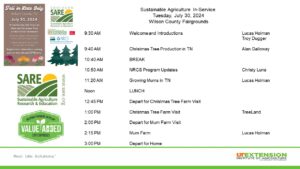
Garden Mum Production Christmas Tree Production 2024 (002)
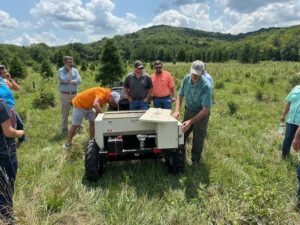
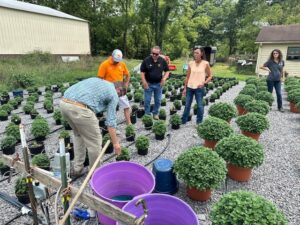
The mission of the Pick TN Conference is to provide educational programming and networking in a collaborative environment which fosters growth to sustain agriculture.
It also supports farmers and farmers market managers to enhance their access to supplies, education, training and to provide networking opportunities to better their farm business.
Six Extension Agents, one Extension Specialist, one Extension Assistant and one Program Coordinator attended the three-day conference. The agenda and meeting schedule can be found at this link: 2024+PTP+Conf+Program+(1)
Attendees had a choice of over 75 educational sessions to attend on a variety of topics. Eight state associations join hands in helping to plan this conference along with Extension, TN Department of Agriculture personnel and local producers. The associations involved are: TN Agritourism Association; TN Association of Farmers Markets; TN Beekeepers Association; TN Christmas Tree Growers Association; TN Farm Winegrowers Association; TN Fruit and Vegetable Association; TN Organic Growers Association and TN Farmer Veteran Coalition.
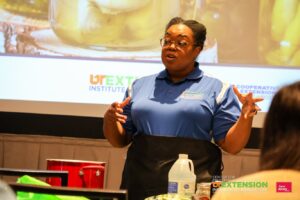
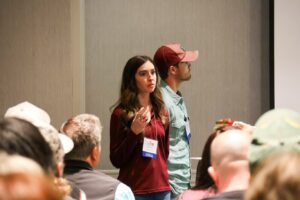
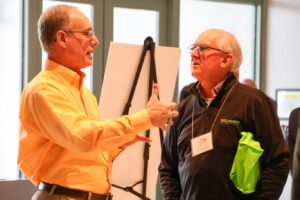
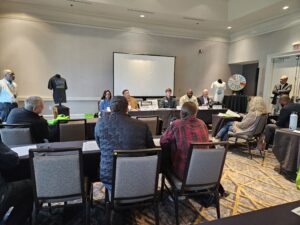
Comments from agents attending the conference in 2024:
- I learned about new farmers market regulations that will impact my local vendors and I will have a chance to inform these producers of these regulations.
- The classes on no-till were the most informative and adaptable to be implemented with low cost on a small scale.
- I attended the "How to Start a Farm Business," where I learned the important steps every farmer needs to start a production farm and how I can better advise my new farmers.
- In the Small Scale Mum Production: Options for Flower Grower Diversification I learned about Mum production and how they can be a great secondary flower to grow for cut flower producers.
- I learned about website design, Facebook and social media marketing. The important things a producer should keep in mind about a presence on the Internet about their farm business, is to keep the website updated, keep it user-friendly and phone-friendly.
Learn about diverse forage systems for cattle producers and evaluate Extension resources (publications etc,.) that are available to agents in Tennessee and Alabama.
Nine Tennessee Extension Agents participated in the Practical Beef Nutrition In-Service Training which was a joint effort between Auburn Extension and Tennessee Extension. Two farm visits were made to look at forage operations in the Elkmont, Alabama area to note cow-calf production systems using a variety of forages. Agents also had the opportunity to have discussions about how producers can use forages to meet the nutritional needs of cattle and to talk about resources available to Extension on forages and cattle production.
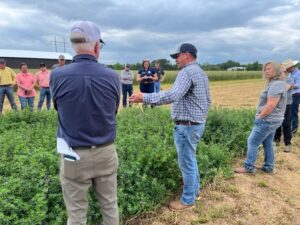
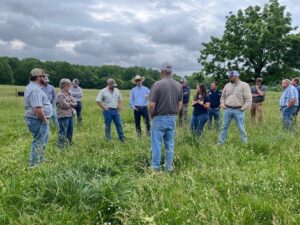
Comments:
- Learned about baling the alfalfa and making haylege instead of trying to dry down the hay - especially in early spring when weather can be a problem.
- The farmer posed a question to the agents in a farm visit - "What could he plant in his pasture that he could use to creep feed 60-90 day old calves?"
- Agents walking through the fields soon discovered the farmer had a good stand of fescue and clover. Some weed pressure was noted, but not enough to worry the farmer.
- Agents decided the best thing to do sometimes is to just leave the field alone or make minor improvements such as planting some winter annuals or filling in bare areas with crabgrass for the summer.
- Learned from one farmer how he sells his hay in square bales in bundles due to the lack of workers helping him, as this allows one person to handle a bundle of bales instead of individually loading however many the buyer wants. This also lets the buyer know how much the hay will cost as he/she pays on the front-end.
- Rotational grazing continues to be a practice that beef operations should consider.
- Had a productive talk with Tennessee and Alabama Specialists and agents discussing educational materials that could be beneficial for future programming and having on-hand for agents' use in their counties.
The council focuses on practices that livestock producers can use to be more efficient in their forage programs. With Tennessee ranking 11th in the nation in the use of farmland to produce hay or for actively grazing livestock, this council provides targeted meetings to discuss this agricultural commodity by presenting emerging issues, industry trends, and opportunities for improving forage management.
Agent Comments after attending the annual TN Forage and Grassland Council Meeting:
- One of the key points I took home was how valuable soil testing is. This meeting also had some great discussion on pasture renovation and what impact that can have on your operation. Dr. Florence also gave a great presentation about lime and some of the alternatives out there.
- The Tennessee Forage & Grassland Council Meeting serves as a vital educational opportunity, not only for farmers but also for agricultural extension agents committed to supporting sustainable agriculture across the state. This annual gathering equips extension agents and producers alike with the latest research and sustainable practices essential for effective forage management. Through expert-led sessions, plot trials, and producer panel Q&A, the Council Meeting provided us with advanced knowledge in regenerative grazing, cover cropping, soil health improvement, and resource conservation. This meeting allows agents to deepen their understanding of sustainable forage systems and build a robust toolkit for addressing producers’ unique challenges in Tennessee. By sharing this knowledge with farmers in the communities, I intend to support the reach of sustainable practices, promoting forages that are resilient to changing climates, reduce input costs, and support thriving rural ecosystems all of which will contribute to livestock health and agricultural profitability across the state.
-
While I am familiar with liming, and have made dozens of recommendations based on soil samples, I did not realize that different lime products have different %RNV values. I am going to look into my local suppliers of lime and get the specific product information for future producer recommendations.
- The TFGC 2024 Annual meeting was one of the best programs I have attended. It provided a great combination of upcoming scientific information, real life experiences from producers, troubleshooting current environmental issues, and excellent hands-on sessions through the demonstration plots. The information provided from all four of these sessions will allow me to help address the very issues and troubles my producers in Williamson County are experiencing. I am extremely grateful for the opportunity SARE provided and will definitely be attending next year
Fall workshop series on wildlife exclusion! Are wild animals eating your produce before your customers can? Learn from the experts about best practices for wildlife exclusion and co-management on your operation. We are hosting one workshop in each region of the state.
- Four Extension Agents attended this training on wildlife exclusion on farms that focus on growing produce. These trainings were held on local farms with presentations from University of Tennessee Specialists. Comments included:
-
Animal Damage Control (ADC) Is very important to the economics of growing ag products and to prevent disease spread. Training on bird and mammal trapping/exclusion/equipment was covered. I have a background in those types of issues and this served as a great update. This information can be used large or small scale as I encounter and receive questions related to ACD from producers and clients.
-
I would say learning about the different traps you can use and how to properly use and bait them to keep animals out of garden areas was probably the most helpful. Also, learning what species are considered non-native and invasive was very helpful.
-
The workshop was great because of all the actual trap, fencing etc. that was displayed and talked about.
-
Provide educational materials for various groups to include Extension Agents, new/beginning farmers and those participating in the Tennessee State New Farmer Academy, use at trade shows and other events, and with the TN AgrAbility staff as they work with veterans transitioning from the military and wanting to start a farming operation.
These materials were completed; funding was needed to print these two crop profiles and one publication.
These publications were already written, SARE Funds were used to print copies in order to have these items for use for agents in various ways. They can be used by agents for information needed in these areas, used with the New Farmer Academy with TN State University, used at trade shows and events as well as with contacts with the TN AgrAbility Program, as these people transfer out of military service and looks to begin a farming operation.
My plans to use these publications:
- Sustainable Agriculture Training for Agents, February 2025
- Make these available for use with the three New Farmer Academies in Tennessee; program conducted in three regions of Tennessee, March – September annually
- Use at trade shows/exhibits with other materials to promote SARE in Tennessee
- Copies of the Growing and Marketing Mushrooms in Tennessee: Provide a copy of this crop profile to county Extension Offices so they know of the availability of this crop profile
- Provide copies of the How to Talk Farming publication to the Tennessee AgrAbility staff as they work with veterans coming from military service to begin a career in agriculture/farming. The AgrAbility staff is now working also with an AGVETS Grant that has a focus on helping those leaving the military and transitioning into farming – this publication and the other crop profiles could prove beneficial to them.
Give Extension personnel the chance to learn sustainable food production through use of regenerative production practices, advancing market opportunities and increase customer access to pasture-based meats.
Three Extension personnel attended this two day conference at Appalachian State University, composed of farmers, chefs, butchers and industry leaders, for networking opportunities, hands-on training and technical and business assistance.
Educational & Outreach Activities
Participation Summary:
Learning Outcomes
Project Outcomes
Face of SARE
The SARE program is a great benefit to agents, specialists and agriculture professionals in Tennessee as it provides them a means to increase their level of sustainable agriculture. This is done by allowing a number of travel scholarships to agents/specialists/ag professionals, where they can learn first-hand by attending conferences, workshops and farm tours covering a wide array of learning opportunities. The need is to branch out more to other agriculture professionals other than Extension to promote teaching, training and application of sustainable agriculture practices to producers. The promotion of the SARE program in Tennessee has this year and will continue to be done in the following ways:
- Annual Agent In-Service Trainings
- Annual Regional/State Agents Professional Association Meetings
- Personal and Group Emails
- Individual Visits with Agents/Specialists
- Farm Visits
- State Website
- Promotional Banners and Exhibits at Trade-Shows, Agent In-Services and Planning Meetings
- Efforts are made to exhibit a seamless SARE program that includes Extension Personnel from the University of Tennessee and Tennessee State University.
